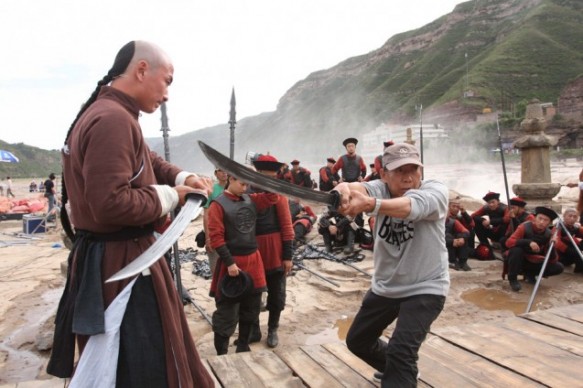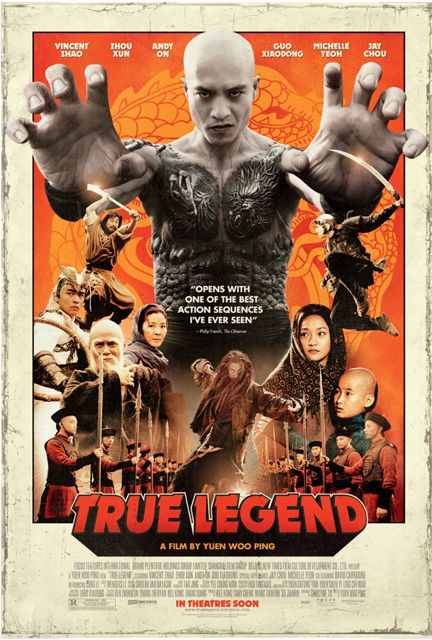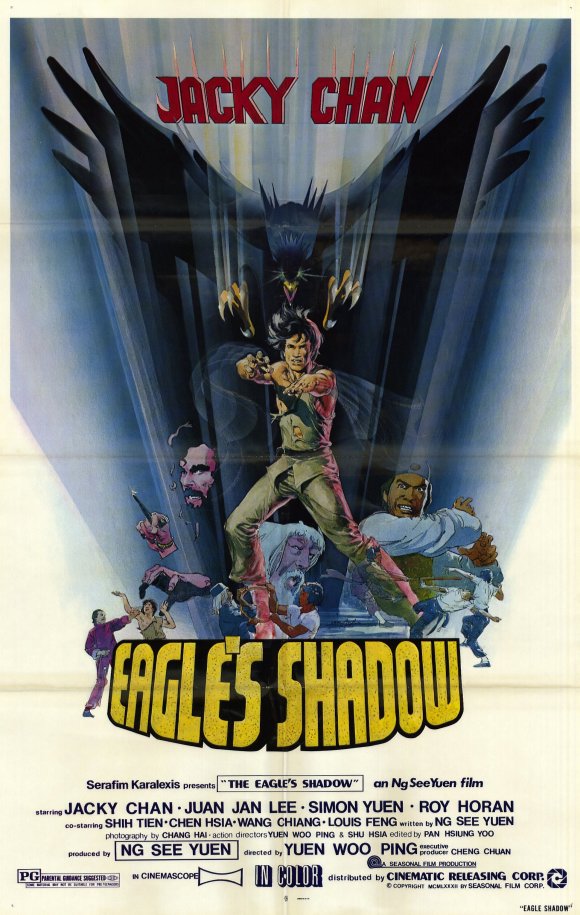Ahoy, squirts! Quint here with another installment of Quint’s Interview Weekend, this time with Master Yuen Woo Ping for his film True Legend.
Yuen Woo Ping is a legend, having directed, acted and headed the fight teams in some of the most famous action movies of all time. Crouching Tiger Hidden Dragon, The Matrix films, the Kill Bill films and Hong Kong classics like Drunken Master, Iron Monkey and, one of my personal favorites, Snake in the Eagle’s Shadow all owe a debt to Master Yuen Woo Ping.
He has a new film coming in May called True Legend, which features a few familiar faces, including Gordon Liu and Michelle Yeoh, and it brings Master Yuen Woo Ping back to the world of Gods and Wushu martial arts.
This interview was done with a team of translators sitting with Master Yuen Woo Ping and I, so it was a bit difficult to piece together. I hope it ends up making some kind of sense!
Enjoy the chat!

Quint: I really liked seeing some familiar faces pop up in True Legend. Michelle Yeoh and Gordon Liu specifically. Can you talk a little bit about the decision of bringing them on board with this film, TRUE LEGEND?
Yuen Woo Ping: After I read the script, according to the characters… Michelle has a history with Asian martial arts and I thought she could pretty much handle the character and handle this role. So, that’s why I chose Michelle to play this role. And for the imaginary Wushu master, (Liu) has a strong reputation in martial arts films. I put him into this film to play the imaginary martial arts master, as it would be believable to convey this idea of the God of Wushu.
Quint: Obviously you are known for your action, but do you also enjoy sitting down and doing the quieter scenes, the character building scenes? So much of what worked in TRUE LEGEND is the family dynamic, especially between the husband and the wife.
Yuen Woo Ping: I really enjoyed filming the quiet scenes also, such as some of the more emotional scenes, like with the family like father and son. For IRON MONKEY, I had those family dynamics, because the mother and the son had that dynamic right there. So I really enjoyed those emotional scenes. Besides, I’m a family man
Quint: I’m a big IRON MONKEY fan. Anybody who has seen it has to love that movie. You’ve worked with so many amazing people. Donny Yen, Jackie Chan, Gordon Liu, Tarantino. You’ve worked with so many people; is there anybody or any particular moment that stands out for you as either a filmmaker or a fight master?
Yuen Woo Ping: The very best memory is working with the director Ang Lee. When the director first approached me about the film CROUCHING TIGER, it stopped my heart. I thought fighting without constraint was too unrealistic in reality. I thought it was too unrealistic for people who don’t know anything about martial arts movies, but the director gave confidence to me to work on this. Ang Lee trusted me about how I was designing all of the fight choreography, so he gave me confidence and communicated with me well. We kept wonderful communication with direction and fight choreography. I didn’t want to exaggerate the flying scenes, but it was a success and the audience accepted it.
Quint: Yeah, well you had just enough reality to sell the fantasy. I’m thinking of the tree top scene in particular where there’s still a fight for balance.
Yuen Woo Ping: Yes. You got it. It was the communication between Ang Lee and I that came together to bring a film like this to life.
Quint: Can you talk a little bit about visual effects and how that has either helped or hindered you as both a filmmaker and as a fight choreographer?
Yuen Woo Ping: Would you mind asking the question again?
Quint: Sure. There is a particular art to directing action and to choreographing action and I can see CGI as a tool being used extremely effectively, though it can also be used to cut corners, taking away that reality you mentioned being so crucial in martial arts films. So my question is how has modern effects helped or hindered you as a filmmaker?
Yuen Woo Ping: My style is more with using the computer effects to support my fight choreography, not the choreography to support the computer effects. I prefer more real action, like you fight with one’s fist, the actors have to really feel it, not have to just imagine it. The computer is there just to enhance the power of the fight, it’s not to substitute for that. I always try to find the best camera angle for the energy. You asked a very good question. Seldom do many people realize that I only use one camera. Always one camera. When people hear of there they go, “Amazing!” People are always like “Why do you use only one camera?” Because there’s only one best angle for any single shot, so we do the whole sequence shot by shot with finding the best angle. You can never have the best two angles at the same time. So, I always find the best angle for my action to show the energy, show the power, and show the movement.
Quint: When you are as talented at creating action and planning action, that also I would imagine keeps you from second guessing yourself. So when you are editing, you don’t have to then feel the need to quickly cut and use everything you’ve shot.
Yuen Woo Ping: As far as the editing, it’s about finding the best way to express the scene. “Do we need to use the computer graphics to make it more powerful?”
Quint: And speaking of, one of the things that I really love about your action work is the fact that you are not afraid to hold on an action scene. You are not afraid of long takes and that really gives the audience a chance to sit back and take in the geography of the fight. I think it’s one of the reasons why CROUCHING TIGER was such a huge film in the states, which isn’t very common for a subtitled film to be a big box office hit. The audience could watch the fight develop. Again, it’s a really long question. I’m really good with the long questions! Can you talk about filming long takes of a particular fight and what you find the benefits of that are? It’s got to be more difficult than getting it in small pieces.
Yuen Woo Ping: I’m not afraid of long takes, because long takes have more visual power. As you said, you can just sit there and watch the whole scene all together and it’s more enjoyable. The second reason is because it’s more realistic. It’s not fake. You can see very movement and every action in the fight through long takes. If it’s filmed with short takes, all you see is just the editing work, not the actual martial arts work. It’s just really important for you to see every movement is not fake. There definitely are a lot of difficulties with filming long takes, because you have to do it in sequence and all together, so the point is the actors must know martial arts. If they don’t know martial arts, I will train them to let them get into it.
Quint: Excellent. So, what’s next?
Yuen Woo Ping: In the near future I will have two films. One is for fight choreography director and another I will actually be an actor. There is no vacation at this point. I’ve got to work because I already have some scripts in hand to get ready.
Quint: Are you doing RZA’s movie?
Yuen Woo Ping: Yeah.
Quint: That should be cool. That looks really good. Well, excellent. Thank you so much.

Upon ending the interview I asked if I could be so intrusive as to ask for an autograph and when I opened up the US one-sheet for Snake In The Eagle’s Shadow, his directorial debut, Master Yuen Woo Ping and his group surprised me with an audible “Oooooo.” When Master Yuen Woo Ping signed it he laughed, pointing to the old man between Jackie Chan’s legs and said “My father.”

Needless to say, that was a very cool moment for me. I wish I could have talked to this man for hours, but as it stands that interview is a quick read, but due to the back and forth with the translators took about 25 minutes to conduct.
Hope you guys enjoyed it! Yet more interviews in the big catch-up marathon coming soon!
-Quint
quint@aintitcool.com
Follow Me On Twitter

